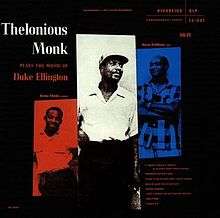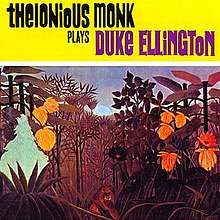Thelonious Monk Plays Duke Ellington
Thelonious Monk Plays Duke Ellington is an album by jazz pianist Thelonious Monk that was released by Riverside in 1956. It was also released under the title Thelonious Monk Plays the Music of Duke Ellington. The album contains Monk's versions of songs by Duke Ellington. The album was reissued by Riverside on March 27, 2007, in the United States and on April 16, 2007, in the United Kingdom.[6]
| Thelonious Monk Plays Duke Ellington | ||||
|---|---|---|---|---|
 | ||||
| Studio album by | ||||
| Released | 1956 | |||
| Recorded | July 21 and 27, 1955 | |||
| Studio | Van Gelder Studio, Hackensack, New Jersey | |||
| Genre | Jazz, bebop[1] | |||
| Length | 36:55 | |||
| Label | Riverside | |||
| Producer | Orrin Keepnews | |||
| Thelonious Monk chronology | ||||
| ||||
| Alternate cover | ||||
 Reissue cover used for pressings from 1958 onward.[3] | ||||
| Review scores | |
|---|---|
| Source | Rating |
| AllMusic | |
| The Rolling Stone Jazz Record Guide | |
| PopMatters | |
Background
Although Monk occasionally performed covers, he primarily played his own compositions. He had recorded several albums of originals during 1953-54 for his previous label, Prestige. But there was a perception, particularly among music critics, that Monk's music was "too difficult"[6] for the mainstream public, and his Prestige albums sold poorly. After Riverside bought out Monk's contract in 1954 for slightly over $100, Riverside convinced Monk to record an entire album of Ellington tunes, an idea of record producer Orrin Keepnews.[6]
Reception
Sean Murphy of PopMatters called it "an outstanding album" when it was reissued in 2007. He called it an "overlooked gem in the Monk discography, sandwiched as it is between his earlier 'genius of modern music' stage and the mid '50s through mid '60s, when he made his most enduring work."[6] Allmusic's Lindsay Planer gave the album four out of five stars and felt that Ellington's characteristic "delicacy and inherently intricate melodies" are ideal for "Monk's angular and progressive interpretations." He recommended it to "all dimension of jazz enthusiast", even though "Monk and Ellington aficionados may rate it slightly higher."[4]
By contrast, David Rickert of All About Jazz found the album "fairly tame" and lagging with "an ambling pace". Although he viewed it as "a worthy addition to any serious Monk collection", Rickert wrote that it lacked Monk's more "abrasive" sound and "obscures what makes Monk so captivating in the first place."[7]
Jazz pianist Marcus Roberts called the album "a masterpiece in jazz" and cited it as a template for his 1990 album Alone with Three Giants. "When you think of great artists paying homage to great artists, that one recording let me know what I had to do."[8]
Track listing
All songs written by Duke Ellington except where noted
Side One
- It Don't Mean a Thing (If It Ain't Got That Swing) - 4:38
- Sophisticated Lady - 4:27
- I Got It Bad and That Ain't Good - 5:52
- Black and Tan Fantasy (Miley, Ellington) - 3:24
Side Two
- Mood Indigo (Ellington, Bigard) - 3:13
- I Let a Song Go Out of My Heart - 5:40
- Solitude - 3:42
- Caravan (Tizol, Ellington) - 5:55
Personnel
- Thelonious Monk – piano
- Oscar Pettiford – bass
- Kenny Clarke – drums
References
- Bailey, C. Michael (March 20, 2004). "Thelonious Monk: Thelonious Monk Plays Duke Ellington". All About Jazz. Retrieved February 21, 2013.
- Kelley, Robin D.G. (2009). Thelonious Monk: The Life and Times of an American Original. New York: Free Press. p. 249.
- Kelley, Robin D.G. (2009). Thelonious Monk: The Life and Times of an American Original. New York: Free Press. p. 249.
- Planer, Lindsay. "Plays Duke Ellington". AllMusic. Retrieved 20 September 2018.
- Swenson, J., ed. (1985). The Rolling Stone Jazz Record Guide. US: Random House/Rolling Stone. p. 145. ISBN 0-394-72643-X.
- Murphy, Sean (October 5, 2007). "Thelonious Monk: Thelonious Monk Plays Duke Ellington". PopMatters. Retrieved February 21, 2013.
- Rickert, David (April 2, 2004). "Thelonious Monk: Thelonious Monk Plays Duke Ellington". All About Jazz. Retrieved February 21, 2013.
- Franckling, Ken (1991). "Alone With Three Giants: A matter of homage, respect and growth". JazzTimes. 21 (2): 15.